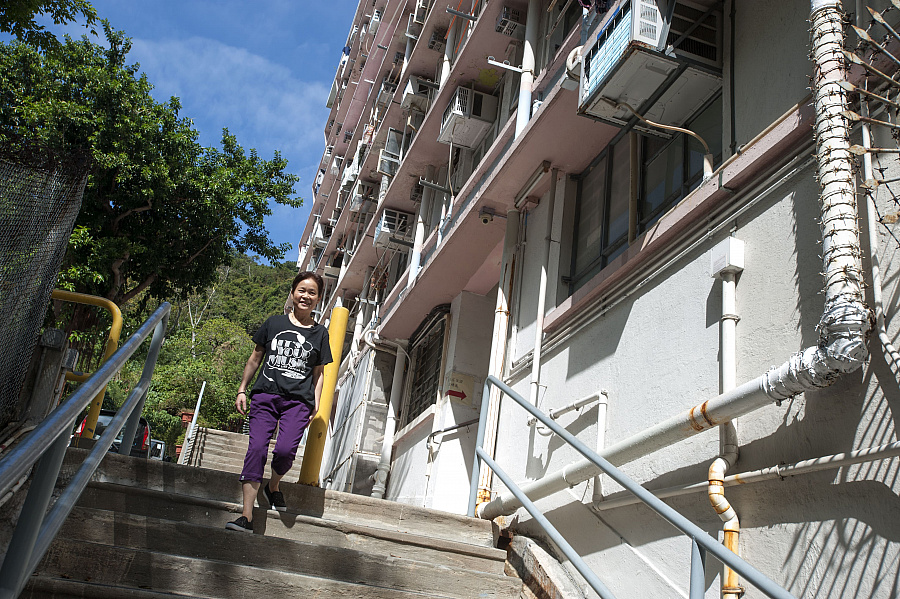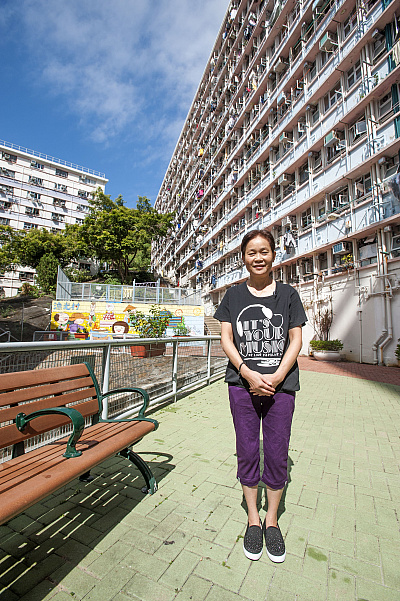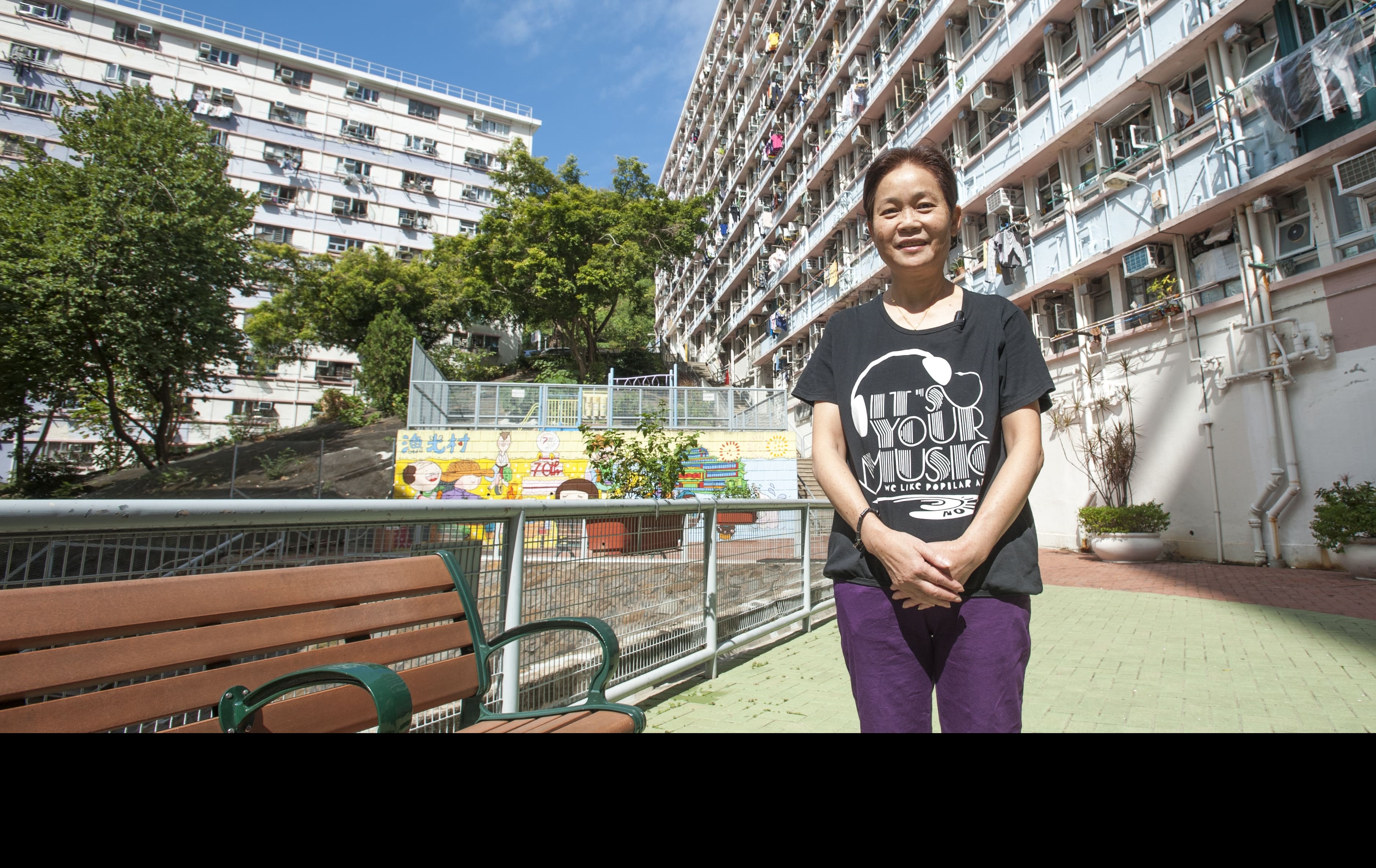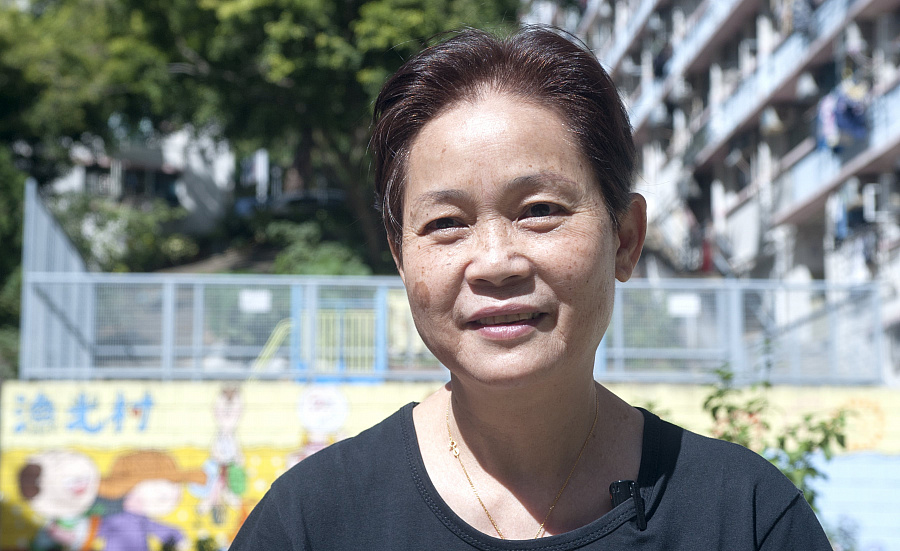CHEUNG Yuk Tim, aged 65, moved into Hoy Kong Lau of Yue Kwong Chuen in 1962, when she was just six years old. She moved out in 1985 after getting married.
*****
The entire Yue Kwong Chuen is Cheung Yuk Tim’s playground. Despite her age, Cheung could still recall the joy and laughter she had in these roundabouts, seesaws, swings, and slides.
Back in the 1960s when children were everywhere, Cheung had to queue before she could play the swing. When it was her turn, she would show the other kids her skills. “I’m spectacular playing with the swings! I turn and turn around the loop, and maintain my balance all the way.”
There also used to be a long slide in the side of Hoy Kong Lau near Shek Pai Wan Estate. The slide was much longer than the plastic replicas found nowadays. “There’s no need to queue. But the blazing sun would make the slide so hot that we had to tread carefully down.”
Hoy Kong Lau also used to be the liveliest block around the area. It contained neighbourhood stores, stationary shops and kindergartens. When friends from outside came to visit, Cheung would buy an ice pop and share it with her friends while playing on the roundabout.
As someone who studied in afternoon schools, Cheung would make use of the time before school to play with kids in the kindergarten. Back in those days, children in kindergartens attended class together. They would learn the alphabets and sing some songs. The lessons would end at 11 am and was followed by playtime.
Hide and seek, rope skipping and Grandma’s footsteps … everyone was welcomed to join the games. Sometimes they played in the park, and sometimes they played in the corridors. The crayons for hopscotch usually came from the school. “We picked up the leftover crayons and drew the hopscotch on the ground. We only need to draw a few circles and the game would start immediately.”
Although the long corridors of Hoy Kong Lau are rather dim, they sparkle in Cheung’s memories. Once, she forgot to bring her keys and decided to slip in through a vent window near the ceiling. “I slipped in like a snake. I had a very small figure back then and people called me ‘tiny girl’. Among my siblings, only I could slip in like that. Our bunk bed was placed right underneath the vent, so I would never hurt myself.”
When playing along the corridor, Cheung was also on the lookout for her mom. Mom was an experienced mahjong player who used to bet quite a bit of money. Back then, the rent for each housing unit was only $700, and Cheung’s mom would bet around $250 per round of mahjong.
But grandpa didn’t like his daughter-in-law playing mahjong. That’s why Cheung and her siblings had to notify their mother whenever grandpa came to visit. During such times, mom would hide the mahjong table away, and pretend to be drinking tea with her fellow neighbours.
There were eight members in the Cheung family. Cheung Yuk Tim came fourth, with two elder sisters, one elder brother, as well as two younger brothers. Cheung’s father used to work in a rice shop, before working as an auxiliary policeman. Sometimes, he would also help out at the old rice shop in Sai Wan.
In fact, the six children of the Cheung family studied in four different schools. While the two younger brothers studied in kindergarten, Cheung Yuk Tim studied in the old public school (i.e. Aberdeen Government Primary School), and her elder brother and sister studied in the new public school (i.e. Island Road Government Primary School). Last but not least, her eldest sister studied at Pui Tak Cannossian Primary School. This is why Cheung would walk to and from school alone. By the time she was home, her mom had already begun to prepare dinner.
Mom always took care of the children and did all the daily chores. In retrospect, Cheung thinks that this had to do with her mom's love, but also the design of Hoy Kong Lau. The early units of Hoy Kong Lau did not have standalone toilets, and the public kitchens were situated in the middle of each floor. The public kitchens would become crowded and dangerous come dinner time, which was probably why mom never let her kids near.
After dinner, Cheung would go watch TV at her neighbour's flat. When it got crowded, the children had to kneel and watch outside the gate. "The flat belonged to the friend of a friend. It was like that back in those days. Later on, when we had our own TV, other children would also come to watch."
Cheung could no longer recall the content of the TV programmes. Yet, she still remembers that the TV was locked inside a wooden box, and only father had the key to unlock it. During weekends, her parents would allow their children to watch TV, until the Queen's icon appeared on screen at midnight.
Beside the public kitchen is the public washing room. Cheung recalls that her family had a semi-automatic washing machine. Her mom would move the machine into the public washing room each day, so as to connect it to the only water hose. The semi-automatic washing machine was a bucket that could move by itself. Yet, all other functions had to be done manually. It was quite a chore to wash clothes with the machine.
“In fact, some families kept the water hose on for days on end. We heard that – for a few months – even all of our rent was not enough to cover for the cost of water. This was why the Housing Society remodelled Hoy Kong Lau so that each housing unit had its own water meter, kitchen and toilet,” said Cheung with a laugh.
The Cheung lived on the 5th floor – with the shared toilet and kitchen – for around ten years. By the time the Housing Society remodelled Hoy Kong Lau, and the Cheung family moved to the 6th floor, Cheung Yuk Tim was already in her early teens. As her older siblings had formed their own families, only five of them still lived in Hoy Kong Lau. This was why – despite the 300 sq. feet space having to accommodate a toilet and kitchen – Cheung felt that it was more spacious than their unit on the 5th floor.
After yet another decade, Cheung also got married and moved to Sai Wan with her husband. Every time that Cheung came back to visit, she couldn’t bare to leave. “If it was too late after dinner, I would stay over for the night. There was one time when security came to check and see if we had an extra resident. But they understood that I was only here for the night, and so let me be.”
Despite Yue Kwong Chuen’s upcoming redevelopment, Cheung does not feel regret. “My parents have passed, and the neighbours are all different … Perhaps it is better to redevelop so that it could accommodate more families. There’s no regret if one thinks of it this way.” Indeed, the Yue Kwong Chuen in Cheung’s memories is filled with constant laughter and cannot be torn down.






